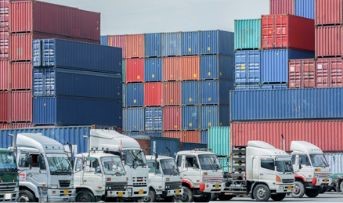Blog Details - Magma HDI

Here are the emerging trends of maritime logistics in India 22nd November 2022
The pandemic significantly impacted every business globally, and the maritime logistics sector was no exception. However, this industry will continue to grow as the supply and demand cycle returns on track post-pandemic.
Maritime logistics involve preparing, implementing, and managing goods and information necessary for ocean carriage. Transporting goods via the ocean route is profitable, but it still has some risks, such as the loss or damage of goods. Marine insurance is a must, as it covers damage that may occur during transit between the starting point and the destination.
With the insurance cover, you can safely run your business, but you will need to stay updated about the latest trends. Here's a list of a few logistics trends significantly influencing the industry.
1. Circular supply chains:
The pandemic made many business owners realise they had to change their approach to developing shipping routes. It helps many businesses develop an alternate, more sustainable supply chain model for future global emergencies.
Shortening the current supply chain structure reduces ocean transit time and allows the industry to adopt an eco-friendlier approach and thereby improving product longevity.
2. New methods for data collection:
Maritime logistics also helps researchers and scientists to provide crucial statistics and weather forecasts. The researchers collect data from ships travelling in different oceans in various regions worldwide to predict weather and make other observations to curate possible solutions for efficient logistics.
The pandemic had put a brake on logistics which caused a lack of data collection for researchers. This made it challenging for researchers to provide accurate weather forecasting and analyse other crucial statistics. Now, researchers are using new methods like marine weather buoys for precise weather forecasts.
3. Automation and Digitalisation:
Tech-based automation shows significance in every sector and a strong future scope. For instance, many warehouses adopt automated processes such as cargo handlers, stacking cranes, unmanned unloaders, and more to improve efficiency and revenue.
Technology also makes the documentation and paperwork process digital. The digitalisation helps boost the organisation's productivity by improving turnaround time and work efficiency. You can expect automation and digitalisation to be an integral part of maritime logistics.
4. Real-time data visibility:
Live location becomes popular demand from consumers and clients. Trading partners and customers expect updates on order locations. With supply chain visibility, business owners help monitor order shipments and provide the clients with updated status of their goods. Knowing the real-time status of your shipping enables you to ensure that your ship and the goods are safe.
5. Systematic policy response:
The pandemic also caused the necessity of a systematic global policy for the logistics industry. Many new policies emerged as the demand for more features and coverage for international shipments. The logistics industry can witness more emergency policy response that helps maritime operations to have resilient and agile transport systems.
6. Decarbonisation:
Carbon emissions have been a major global problem for the last decade. Logistics ships are the main culprits for heavy oil emissions. These days, the enforcement of controlled carbon emissions has become strict, causing maritime operators to opt for fuel-efficient routes. The IMO (International Maritime Organization) aims to reduce greenhouse emissions and the carbon emissions caused by shipping by 40% in the next ten years.
Understanding the demands of consumers and the need for technology in the logistics process is the need of the hour to strengthen the maritime logistics sector in India. Business owners must plan and implement new trends in their logistics businesses to create better growth opportunities. Shortening supply chains can help lower carbon emissions and benefit the environment. Similarly, it would help if you also considered getting marine insurance to provide reliable coverage against losses due to damage to goods during sea transit.
Click HERE to buy marine insurance.
Disclaimer: The information provided above is for illustrative purposes only. To get more details, please refer to policy wordings and prospectus before purchasing a policy.

